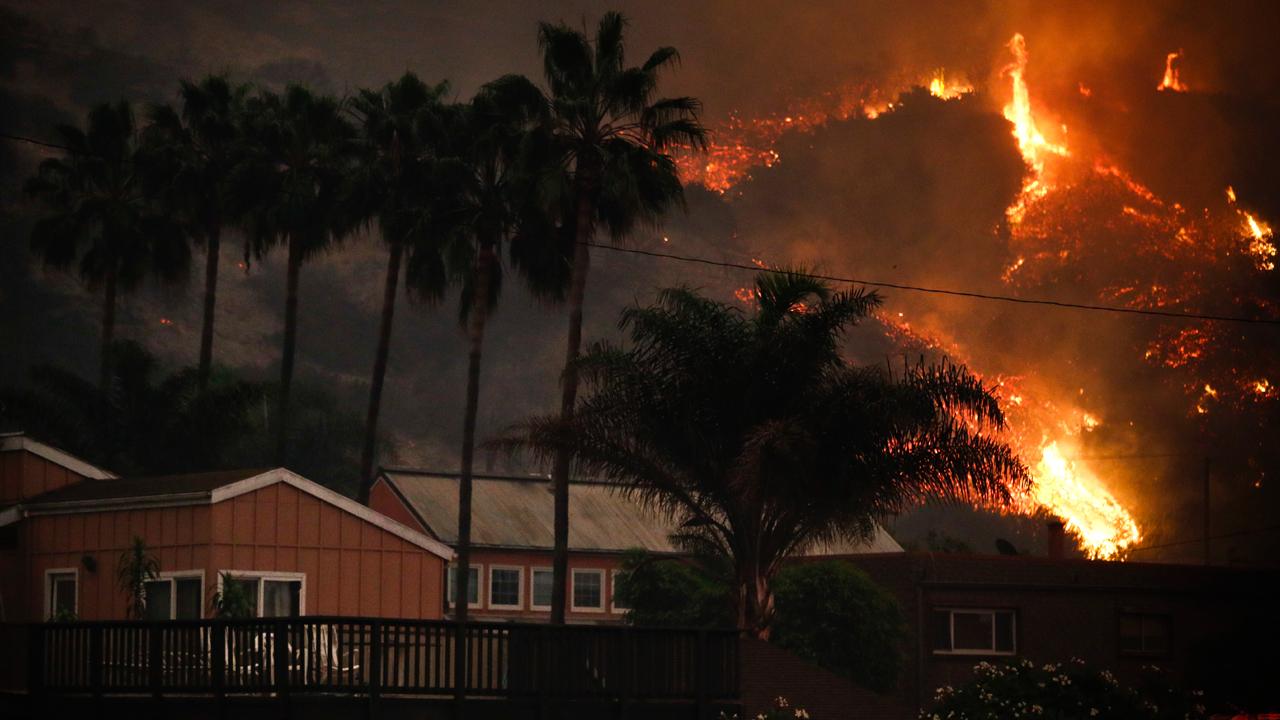Firefighters battle intense wildfires in Southern California
Firefighters battled several intense wind-driven wildfires early on Friday across densely populated Southern California that have destroyed at least 500 structures and chased tens of thousands of people from their homes over the past five days.
More than 5,700 firefighters from across California and the region worked to stop the spread of six large wildfires and other smaller blazes that have erupted since Monday, from Los Angeles up the Pacific coast to Santa Barbara County, and stoked by fierce westward Santa Ana winds.
Firefighters and helicopters sprayed and dumped water and fire retardant on the inferno, against a hellish backdrop of flaming mountains and walls of smoke as the blaze hopscotched over highways and railroad tracks and torched rows of houses.
The raging fires have forced the evacuation of about 190,000 people and threatened 23,000 homes as of late on Thursday, CAL FIRE said in a post on Twitter.
The Los Angeles Unified School District, the country's second largest with more than 640,000 students, closed more than a quarter of its nearly 1,100 schools for a second day on Friday. The University of California Santa Barbara canceled Friday classes as well.
The Thomas Fire northwest of Los Angeles grew to 115,000 acres (46,540 hectares) from 96,000 acres (38,850 hectares) and destroyed 439 structures, officials said. More than 2,600 firefighters from as far away as Portland, Oregon, and Nevada were battling the blaze, which was just 5 percent contained.
North of San Diego, another blaze called the Lilac Fire swelled from 10 acres to 4,100 acres (1,659 hectares) in just a few hours on Thursday, CAL FIRE said, prompting Governor Jerry Brown to declare a state of emergency for San Diego County.
The blaze destroyed 20 structures and prompted evacuations and road closures. Propane tanks under several houses exploded from the heat, sounding like bombs, according to a Reuters photographer at the scene.
Three people sustained burn injuries and another suffered from smoke inhalation in the Lilac Fire. Two firefighters were also injured, CAL FIRE said on Twitter early on Friday.
POLLUTION 'OFF CHARTS'
The other fires, which broke out on Monday and Tuesday, have reached into the wealthy enclave of Bel-Air on the west side of Los Angeles. Some major highways in the densely populated area were intermittently closed.
In the seaside enclave of Faria Beach, caught between burning mountains and the Pacific Ocean northwest of Ventura, fires spread down the smoking hills. Flames jumped the heavily used U.S. 101 highway and headed toward clusters of beach houses. Firefighters lined up along a railroad track, the last barrier from the flames.
Heavy smoke made breathing hazardous in some areas, and residents were urged to stay indoors. Ventura County authorities said air pollution measures in the Ojai Valley were "off the charts."
The Los Angeles Police Department tweeted, "LAPD Working to Save Every Californian, Pets Included" along with a photo of a police officer in a respirator rescuing a cat. The Los Angeles County animal shelter said it was hosting 184 pets including llamas, donkeys and horses while reports said 29 horses were burned to death on Tuesday at a ranch in the Sylmar neighborhood of Los Angeles.
The Skirball Fire in Los Angeles has forced hundreds of residents in the wooded hills near the Bel-Air neighborhood to evacuate and charred more than 475 acres (192 hectares).
Skirball threatened media magnate Rupert Murdoch's Moraga Estate winery. The property was evacuated, with possible damage to some buildings, Murdoch said in a statement, but "we believe the winery and house are still intact."
Utilities cut power to customers in some mountain communities northeast of San Diego and east of Los Angeles to limit fire danger. The outage could last several days.
The fires are the second outbreak to ravage parts of California this autumn. The celebrated wine country in the northern part of the state was hit by wind-driven wildfires in October that killed at least 43 people, forced some 10,000 to flee their homes and consumed at least 245,000 acres (9,900 hectares) north of the San Francisco Bay area.
The California Department of Insurance said the northern California blazes caused insured losses of more than $9 billion.
(Additional reporting by Brendan O'Brien in Milwaukee; Editing by Peter Graff and Bernadette Baum)




















